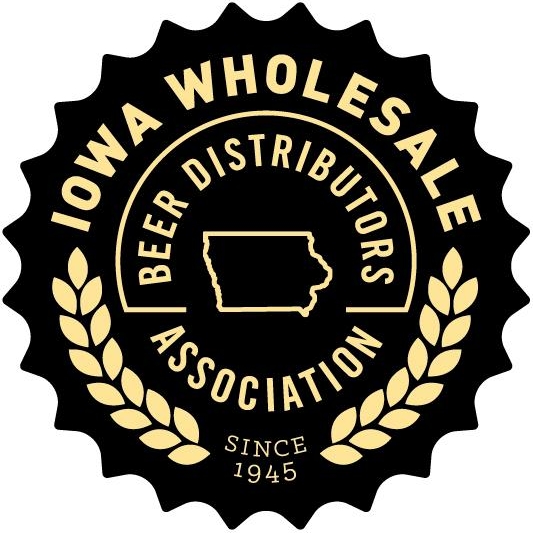Cash Law
- Prevents unfair marketing practices.
- Ensures fair competition.
- Assures funds are available to meet state tax obligations.
- Eases the enforcement burden at both the state and federal level.
- Allows for accurate and expedient transactions.
- Eliminates the incentive to promote the abuse of alcoholic beverages.
The Iowa Wholesale Beer Distributors Association has always supported strict, uniform, fair, and impartial enforcement of the laws and regulations governing the beer industry. We are keenly aware that this is a customer service oriented business, which exists through public approval and acceptance. It, therefore, must be controlled and operated under a system with the public interest and welfare foremost in mind.
In order to fully understand the rationale for the cash law, it is important to remember that it is an integral part of the tied-house act. The Iowa “cash” law is substantially similar to those of thirty-one other states in the U.S. Many of these cash laws were enacted shortly after passage of the Twenty-first Amendment and repeal of Prohibition in 1933.
At the same time, the federal tied-house act established a three-tier distribution system. Brewers and National Importers on the first level, wholesalers and distributors on the second level, and retail licensees on the third level.
The acts were designed to prevent brewers, importers, or wholesalers from engaging in marketing practices, which would induce retailers to purchase products to the exclusion of others. It is no coincidence that thirty-one states require cash, check, or electronic transfer upon delivery of beer.
The policies of Iowa as expressed in the cash on delivery regulation reflect the belief that competition for beer sales not be based on practices such as extension of credit. The introduction of credit into the relationship between wholesalers and retailers would introduce an element, which will threaten several cornerstones of our control system. For example, retailers who make unwise use of credit purchases for beer will have a new incentive to promote the use of alcoholic beverages at a time when society wants to stabilize or reduce consumption.
The net result would create a serious enforcement problem and unhealthy marketplace situation. The potential for abuse and enforcement problems is easily recognized considering the economic influence some of the large chain operations can generate.
Purchasing power is certainly concentrated in large retail operations. Beer wholesalers are small, family-owned businesses who can ill afford extension of credit and credit abuses in conduct of their business.
It is not difficult to imagine that a retailer having been the beneficiary of generous credit arrangements might reciprocate by favoring the products of that larger wholesaler to the exclusion of the smaller wholesaler unable to extend generous credit arrangements. The enforcement burden at both the state and federal level would increase substantially.
In 1958, Iowa had 225 beer wholesalers. In 1974, Iowa had 125 beer wholesalers and today there are 38. These wholesalers service more the 7,700 retail accounts in our state.
Thirty-five of Iowa’s ninety-nine counties are border counties. None of the states bordering Iowa have a forced deposit law. Iowa’s forced deposit law adds $1.44 per case to beer purchased in Iowa.
Additionally five of the seven states bordering Iowa have excise taxes lower than Iowa’s $5.89 per barrel. ($.43 per case).
The Beer Institute estimates selling beer on credit adds another $.42 per case. Iowa’s beer wholesaler industry cannot afford that price increase. With 30 days credit, chain operations, many of whom turn their stock on average of four times per month, would collect four times from consumers prior to paying for the first delivery of product from the distributors.
Some segments of the industry complain that retailers are the only segment required to pay cash on delivery, implying that the law was adopted to benefit wholesalers. As stated previously, the law prevents objectionable practices and insures fair competition in the marketplace of the public good.
Considering another aspect of the “cash” law is the accuracy and expediency of a transaction when both parties have a sales invoice and a complete, immediate record of the transaction. This also creates detailed records for the state auditors when auditing beer wholesalers.
Iowa beer wholesalers remit over $13 million annually to the State of Iowa for beer excise tax. The historic system of cash to the retailer and cash to the wholesaler has worked to the benefit of the State of Iowa and should be protected.
The most important consideration in all of the alcoholic beverage laws and regulations is not whether a particular requirement places an inconvenience or burden on one segment of the industry or another — but that each requirement be designed to facilitate the best possible system in the public interest.
Iowa Law (123.45) prohibits beer wholesalers from extending credit to retailers.

